- Home
- Jack Canfield
Chicken Soup for the Country Soul Page 14
Chicken Soup for the Country Soul Read online
Page 14
Then, in 1970, Glen Campbell invited me to be an accompanying musician on his Good time Hour television show. We used to kid around with one another, and one day backstage I found myself trading jokes with Glen and some of his guests.
“Hey, Mel,” Glen said, suddenly serious, “you’re funny, you know that?”
“Yeah,” I said, laughing, “really funny.”
But Glen wanted me to know he wasn’t kidding. “I’d like to use you on the show, have you introduce yourself in a skit.”
“No way!” I said.
I kept trying to back out, but Glen and a few others wouldn’t hear of it. They helped me to rehearse what I’d say to the audience, but I was so nervous that the few lines I practiced kept coming out as messed up as a two-headed calf.
The night before we were to tape the show, I called my wife, Doris, at our home in Tennessee. “I don’t know what I got myself into, honey,” I said, “but right now I feel like I want out.”
Before I knew it, a bunch of yelling broke out on the telephone, not just from Doris but from our four kids who were on other extensions. “Daddy, you better do it,” said my boy Mel Jr. “I told all my friends you were going to talk on television.”
I gulped. Then Doris, in her soothing way, said, “I hope you realize we’re all behind you. Don’t be afraid.”
Afraid. Yep, that’s what I was. When I hung up the phone, my mind went back to a scrap of paper. Its words by now were as clear in my memory as they must have been on that paper when Mr. Miller first wrote them. God . . . I began silently.
The next day, I went to face the TV cameras. “The other d-d-day, somebody asked me when I was going to b-b-be on television.” I stuttered to the audience, trying to get out my introduction to my song. “I t-t-told them two years. I just w-w-wasn’t sure when I w-w-would ever finish th-th-this introduction.”
To my amazement, everybody laughed along with me. And my fear got drowned out in the laughter. I could poke fun at myself, and people would respond—not in ridicule, but in warmth and fun. The audience would accept me, just as I was. And, more important, the prayer that Mr. Miller gave me had finally taught me to accept myself.
Mel Tillis
Just a Plain Ol’ Country Girl
Keep learning, keep doing and get your ducks in a row. Then, when opportunity knocks, you’re ready.
Buck Owens
I was twenty-eight years old, the age when most young people have their eyes firmly fixed on the promise of success— and I was a failure. Life had reached a dead end for Sarah Ophelia Cannon, the aspiring dramatic actress from Centerville, Tennessee.
Six years earlier, fresh from Ward-Belmont College, I had joined a theatrical production company in Atlanta, and had been going into small towns and rural communities producing country-style musical comedies. But now, in the summer of 1940, the country was in a depression, radio and changing times had altered people’s tastes, and amateur shows weren’t all that big anymore.
So, jobless and with nothing else in sight, I went back to Centerville. To bring some money into the house, I finally got a WPA job as a recreation-room director. It paid fifty dollars a month, for which I was grateful, but it sure was a dull job.
I felt so frustrated in my plan to be a dramatic star that I kept praying, “God, where, where, where do I go? What do I do?” And when no answers came to me, I found myself questioning God in despair.
Restless and dissatisfied though I was, it was nice in a way, to be back home. I tried to relieve the dullness of my job by teaching some of the town’s youngsters music and drama. And when I got a chance, I’d try my luck as a performer, myself. I’d dress up as this rangy country girl, which I was anyway, and tell little stories and jokes that I’d picked up during my years with the production company, living around country folk. I gave this country girl a name—Minnie Pearl.
Summer faded, and my spirits sank lower and lower. One dreary October afternoon I was in the WPA recreation room, waiting for the children to thunder down on me when a banker friend, Jim Walker, came in.
“Ophelia,” he said, “we’re going to have a banker’s convention here. I understand that in the evenings you’ve been teaching some children dramatics and dancing and singing. Would you let the children entertain the bankers?”
I said, yes, of course. He started to walk away, then he stopped and turned. “Oh, by the way,” he added, “the speaker from Chicago is flying into Nashville and then driving to Centerville. If he’s late, would you mind doing that thing you do?”
“You mean Minnie Pearl?”
“That’s it. Would you kill time with this Minnie Pearl thing until the speaker gets here?”
I told Jim I’d do it.
That night we performed for the bankers. The children sang and danced to old-time, popular songs while I was backstage, disheveled and frantic, getting the children off and on the stage.
We finished the program, and Jim came backstage. “The speaker’s not here yet, Ophelia. You’ll have to help us.”
“All right,” I told him. “Just give me a minute to straighten up.” Then I went out in front of the hundred or so men in the audience and said, “I’d like to give you my interpretation of the mountain girl, Minnie Pearl.”
I started telling them about the marvelous, mythical town of Grinder’s Switch, about my Uncle Nabob and Aunt Ambrosia and Brother and his dog and the horseshoe and all those silly things. And the bankers were laughing and applauding. When I ran out of stories, I looked over at Jim, and he shook his head.
“No,” he said, “he’s not here yet!”
So I went over to the piano and started playing and singing—“Maple on the Hill” and “Careless Love” and “Red River Valley” and a lot of other old country songs. The men loved it.
After I’d sung awhile, and still no speaker, I said to the audience, “Well, let’s just all sing.” The men joined me in “My Wild Irish Rose” and “Let Me Call You Sweetheart.”
Then finally Jim came over to me and said, “He’s here. You can stop now.”
The men shouted, “Oh, no! Let’s sing some more!” I smiled real big, thanked them real big and turned the program back over to Jim.
When I got home, Mama asked me how it went. “Oh, pretty well,” I said. I had just spent the evening clowning. It didn’t mean anything.
But one of the bankers in the audience, Bob Turner, knew Harry Stone, the manager of the great country music station in Nashville, WSM. “Harry,” he told him, “there’s a girl down in Centerville who belongs on that Grand Ole Opry. She’s down on her luck. I know her family; I come from down that way—and if you can give her a break, it sure would be a big favor to me.”
Harry Stone said all right and had me come up for an audition. And that changed my whole life. It was the beginning of Minnie Pearl, and, to me, the beginning of a new way to look at things.
I saw at last that I had become a failure only because I wouldn’t accept what I truly was. I had been trying to become something I couldn’t be. I would never be a great dramatic actress; I was Minnie Pearl, a plain, comic country girl, poking fun at herself and sharing that fun with others. When I learned to accept that role, the one God had given me, he turned my failure into success.
Sarah Ophelia Cannon
Confidence Builder
True country music is honesty, sincerity and real life to the hilt.
Garth Brooks
Times were hard all over. When I was fifteen, my parents lost our family farm in the Ozark Mountains and we moved into the town of West Plains, Missouri. By the time I was in my late teens, I had a job as a butcher for Sid Vaughn’s Meat Market. I loved music, and when business was slow—which was fairly often—I’d pick up my guitar and play and sing for Sid to pass the time.
Sid thought I had talent. He convinced the local radio station, KWPM, to broadcast a fifteen-minute show three days a week from the market. When Sid told me, I was terrified. But Sid thought it would be good for business, and I
wanted to help out. In fact, it turned out it wasn’t that bad. At the start, it was only me and Sid and the engineer, so I could pretend we were just passin’ the time, as always.
The reaction was satisfying. Sid’s business quadrupled within weeks. Still, I was so shy that it took three months before I felt comfortable enough to laugh out loud on the air. Who would have thought that people would notice? But they did. The local folks stopped in, or dropped a note, saying they liked my music, and I should laugh more often. Their friendly acceptance was a real boost to my confidence.
But as soon as I began to feel comfortable playing for my neighbors there in West Plains, another crisis came my way. I’d come to the attention of the folks at KWTO, the big country music station out of the city of Springfield. The station manager, Ralph Foster, offered me my own early-morning show; I would also join the entire KWTO cast on the popular noontime Ozark Farm and Home Hour. E. E. “Si” Simon, one of country music’s legendary businessmen, offered to manage me.
I was ecstatic but terrified. Thirty-five dollars a week, just for making music? Back then, that was a lot of money, even more than I made doing “real work” at Sid’s. But to leave West Plains for a big city? Could I handle it?
I did the only thing I could think of. I asked my friends and neighbors for help. “I’ll be up there all by myself in the big town,” I said on my last local broadcast. “Please write me if you can.”
I got to Springfield on Saturday night; my first show was Monday morning at 5:30 A.M. KWTO had their own band who would back me. We only had one session on that Sunday to practice the songs I’d be singing. The band members seemed real nice; but I didn’t know them and they didn’t know me, yet I was expected to go on the air live with only one rehearsal.
Monday morning I was so nervous I could barely get my fingers to work. I wasn’t in Sid’s anymore; I was in a fancy studio with a control booth and lights that told you what to do. And this wasn’t a show for my neighbors; KWTO broadcast to four states.
Well, the show started, and after the first song, my nerves felt worse than ever. So I did what I’d learned to do back in West Plains—I told the truth.
“Folks,” I said, “I’m a country boy, and I sure am nervous coming to a city like this and singing. I hope you like me and my music. If you don’t, drop me a line anyhow; I’d love to hear from you.”
I’m sure the backup band thought I was crazy telling everybody that I was shy and nervous, but I figured they could tell anyhow and it was best to come out and be honest about it. It helped me, anyway, and the next song was a little easier to sing.
Everybody at KWTO had a little cubby mailbox, and I kept close watch on mine. Tuesday: nothing. Wednesday: empty. Thursday; I started to worry. Maybe folks did n’t like my singing, and they were too polite to tell me so. But what could I do? There was nothing on Friday, either, and I worried about that, and my decision to come to Springfield, all weekend.
Still trying to decide what to do, I went in on Monday morning and did my show, then went across the street to the diner for breakfast. When I came back by the mail desk, the lady in charge said, “Porter, when are you going to pick up your mail?”
I said, “Well, I guess as soon as I get some.”
She said, “Oh, Honey, you need to look down in the basement; you’ve got boxes of mail down there.”
Well, I ran down those basement steps and there were three huge boxes—real tall and stuffed full of mail—and all of it was for me! There were thousands of letters, from people everywhere.
I was so overwhelmed that I sat down and cried, probably for ten minutes straight. It was the most touching thing that had ever happened to me in my life. Every time I’d start to get up and go upstairs, I’d start crying again to think that so many people had taken the time to encourage a kid like me.
Finally I pulled myself together because I knew I had to get ready for the noon show. I went upstairs, and as I walked past Ralph Foster’s office, he hollered at me, “Hey, come in here a minute, Porter; I want to see you.”
I was embarrassed because it was obvious I’d been crying, but when the station manager calls you in, you go.
Ralph said, “I guess you’ve seen all the mail downstairs?”
I said, “Yeah, I sure did.”
He said, “Well, we’ve never had anybody get that much mail before in the history of this radio station. I thought you might be interested to know that we’re going to start you at double what we said we would—at seventy dollars a week.”
I couldn’t believe it. It was all I could do to not start crying again. I stammered out my thanks and added, “I’ll always try to do a good job for you.”
I was just a shy country boy from West Plains, who was lucky enough to be taught early on the importance of being honest with your audience—honest with people— and not to be ashamed to be exactly who you are.
Porter Wagoner
The Dream
It’s important to dream.
Conway Twitty
We’re living this story we’re about to tell you. We will always be living it as long as we’re alive and working together as a family.
Our daddy, Johnny Wiggins, came to Nashville in 1958 and worked odd jobs. He loved music and wanted to be in the business, but he didn’t know anybody here, like so many people. What he did know was how to work on engines—he was a mechanic. So one of the jobs he finally got was with the Metropolitan Transit Authority, where he worked on buses. Daddy also made good friends with the manager of the bus company.
Ernest Tubb was one of the few touring acts that had a tour bus at the time. Back in those days, the band took turns driving the bus. When it broke down, they had to call the wrecker and get it towed in to the shop. So Ernest was the guy who came up with the idea to hire somebody to drive the bus and be able to work on it when it broke down.
One day when he was bringing the bus in to get repaired, he asked the manager to recommend someone. The manager told him about our daddy, and he got hired on the spot!
Well, what Ernest didn’t know was that Daddy was trying to get into the music business when he started driving for him. After working for Ernest for a few years, Ernest found out that Daddy could sing and he started letting him open shows. He put him on the cover of the Troubadour albums and Daddy ended up getting a deal with Decca Records.
His career was just getting started, which is what he always wanted. Ernest Tubb was notorious for touring an extended amount of time. At one time, Daddy was gone fifty-two days straight.
One time, when my older sister and I were still in diapers, a cab dropped him off in front of the house. I was out playing in the driveway and I ran away from him. That’s when he realized that with something he loved as much as me in his life, he would have to make a choice between the business or raising his family. So he made that decision and took us back to North Carolina, where he worked for his brothers in the paving business. It was really hard for him to leave it behind. But he never really could quite give up the music that was so deep within him.
As Audrey and I grew, he saw a talent there and he began to develop that talent. He’d let us go out and sing at private parties; he had me singing with the Troubadours when I was four; and Audrey at the Grand Ole Opry when she was twelve.
Eighteen years ago he had the idea to have us sing together as a duet. He said, “There’s not a family act in country music right now. There’s not a brother and sister act, so it would be great if we could get the two of you together.”
After six years we finally got a record deal and things were just starting to take off. Daddy always said that he wanted to be on Mercury Records and he had a feeling that one day his kids would somehow be involved with them.
We got a deal in January of 1993. We were here in Nashville when we got the call. I had just found the song “Has Anyone Here Seen Amy” on a Friday and I was going to call Daddy on Saturday. Daddy had heard a couple of cuts on this album. We had been working on it for two yea
rs. I was going to call him that day. He and Momma were going out to dinner and I loved this song so much that I wanted Daddy’s opinion on it. He died that night before I could play it for him—killed in a car wreck.
It was awful. We were finally seeing our dreams of a debut album, and he was finally seeing his dreams come true vicariously through us. And then we lost him.
So on our next album we found a song called “The Dream.” It was about what we do. Working all your life and being drawn to country music because it’s in your blood despite all the hardships that go along with the music business. We wanted to somehow include Daddy on this album.
On one of those old Troubadour albums, Ernest Tubb introduces Daddy at the Spanish Castle Ballroom in Seattle, Washington. Our producer took segments of that night and put it with our song called “The Dream,” which brings it all full circle. Daddy always wanted to be on Mercury Records and now he finally is—with us.
John and Audrey Wiggins
The Front-Row Seats
The Bible says, “All things are possible.” I believe that.
Dolly Parton
My family have always been country music fans. My mother’s favorite entertainer was Porter Wagoner, and even as a little girl of five growing up in Louisiana, Momma passed that “hero worship” on to me. While all of my friends were singing Beatles tunes, I knew all the words to “Slew Foot.”
One of my earliest memories was the day Porter was to perform near my hometown at the Ponchatoula Hayride. We stood in line for four hours just waiting for the doors to open so we could get a good seat. Unfortunately, hundreds of other people had the same idea, and by the time Momma made it through the rushing crowd, protecting her small daughter, we had to sit near the back of the building. Instead of being disappointed, Momma smiled at me, took my hand and said, “That’s okay, baby. One of these days we’re going to have front-row seats.”

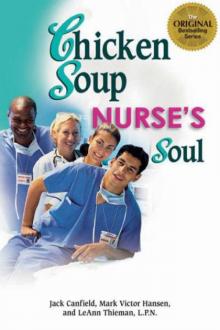 Chicken Soup for the Nurse's Soul: Second Dose
Chicken Soup for the Nurse's Soul: Second Dose Chicken Soup for the Ocean Lover's Soul
Chicken Soup for the Ocean Lover's Soul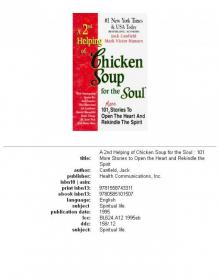 A 2nd Helping of Chicken Soup for the Soul
A 2nd Helping of Chicken Soup for the Soul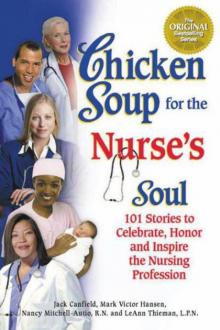 Chicken Soup for the Nurse's Soul
Chicken Soup for the Nurse's Soul Chicken Soup for the Breast Cancer Survivor's Soul
Chicken Soup for the Breast Cancer Survivor's Soul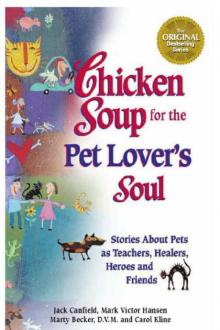 Chicken Soup for the Pet Lover's Soul
Chicken Soup for the Pet Lover's Soul Chicken Soup for the Bride's Soul
Chicken Soup for the Bride's Soul A Chicken Soup for the Soul Christmas
A Chicken Soup for the Soul Christmas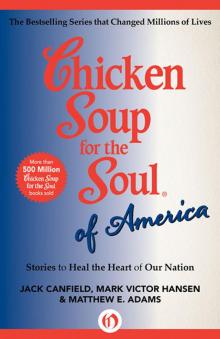 Chicken Soup for the Soul of America
Chicken Soup for the Soul of America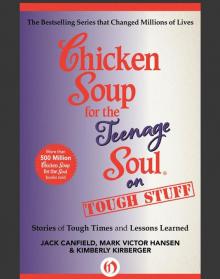 Chicken Soup for the Teenage Soul on Tough Stuff
Chicken Soup for the Teenage Soul on Tough Stuff A Taste of Chicken Soup for the Teenage Soul III
A Taste of Chicken Soup for the Teenage Soul III Chicken Soup for Every Mom's Soul
Chicken Soup for Every Mom's Soul Chicken Soup for the Dog Lover's Soul
Chicken Soup for the Dog Lover's Soul A Second Chicken Soup for the Woman's Soul
A Second Chicken Soup for the Woman's Soul Chicken Soup for the Soul the Book of Christmas Virtues
Chicken Soup for the Soul the Book of Christmas Virtues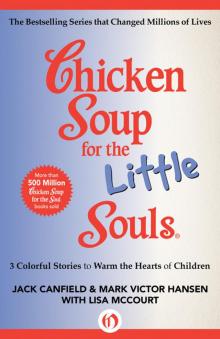 Chicken Soup for the Little Souls: 3 Colorful Stories to Warm the Hearts of Children
Chicken Soup for the Little Souls: 3 Colorful Stories to Warm the Hearts of Children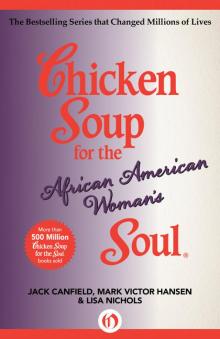 Chicken Soup for the African American Woman's Soul
Chicken Soup for the African American Woman's Soul Chicken Soup for the Soul
Chicken Soup for the Soul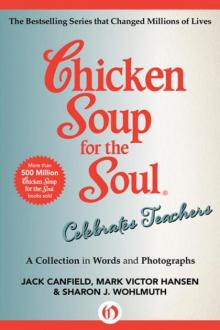 Chicken Soup for the Soul Celebrates Teachers
Chicken Soup for the Soul Celebrates Teachers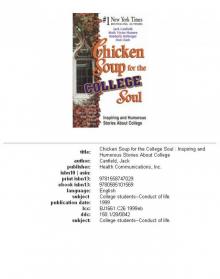 Chicken Soup for the College Soul
Chicken Soup for the College Soul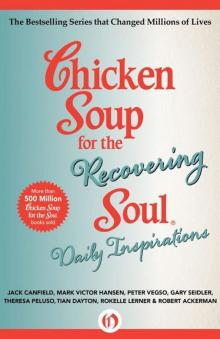 Chicken Soup for the Recovering Soul Daily Inspirations
Chicken Soup for the Recovering Soul Daily Inspirations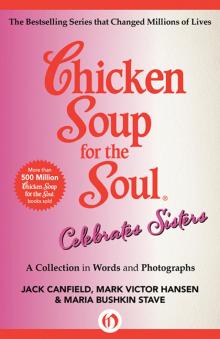 Chicken Soup for the Soul Celebrates Sisters
Chicken Soup for the Soul Celebrates Sisters Chicken Soup for the Dieter's Soul
Chicken Soup for the Dieter's Soul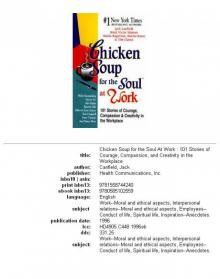 Chicken Soup for the Soul at Work 101 Stories of Courage
Chicken Soup for the Soul at Work 101 Stories of Courage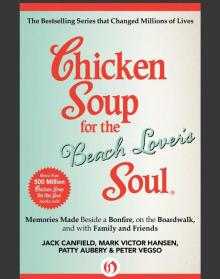 Chicken Soup for the Beach Lover's Soul
Chicken Soup for the Beach Lover's Soul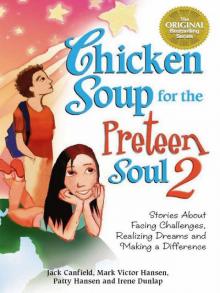 Stories About Facing Challenges, Realizing Dreams and Making a Difference
Stories About Facing Challenges, Realizing Dreams and Making a Difference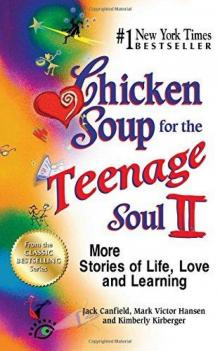 Chicken Soup for the Teenage Soul II
Chicken Soup for the Teenage Soul II Chicken Soup for the Girl's Soul
Chicken Soup for the Girl's Soul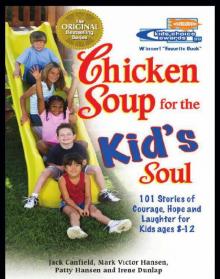 Chicken Soup for the Kid's Soul: 101 Stories of Courage, Hope and Laughter
Chicken Soup for the Kid's Soul: 101 Stories of Courage, Hope and Laughter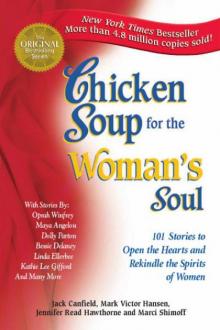 Chicken Soup for the Woman's Soul
Chicken Soup for the Woman's Soul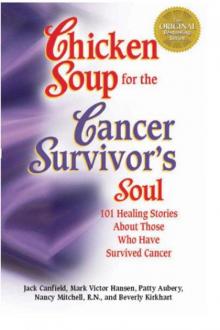 Chicken Soup for the Cancer Survivor's Soul
Chicken Soup for the Cancer Survivor's Soul Chicken Soup for the Canadian Soul
Chicken Soup for the Canadian Soul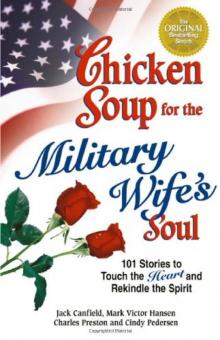 Chicken Soup for the Military Wife's Soul
Chicken Soup for the Military Wife's Soul A 4th Course of Chicken Soup for the Soul
A 4th Course of Chicken Soup for the Soul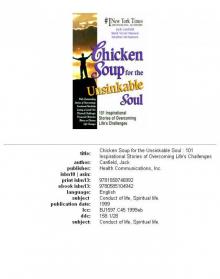 Chicken Soup Unsinkable Soul
Chicken Soup Unsinkable Soul Chicken Soup for the Soul: Christmas Magic
Chicken Soup for the Soul: Christmas Magic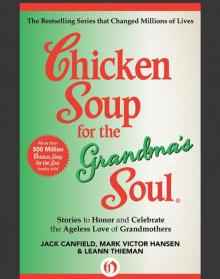 Chicken Soup for the Grandma's Soul
Chicken Soup for the Grandma's Soul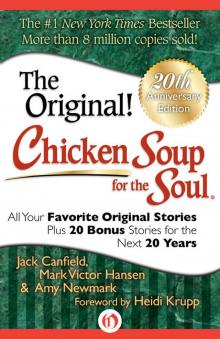 Chicken Soup for the Soul: All Your Favorite Original Stories
Chicken Soup for the Soul: All Your Favorite Original Stories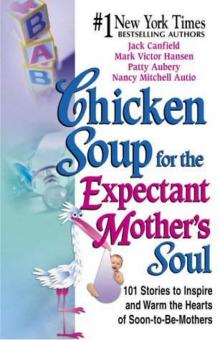 Chicken Soup for the Expectant Mother's Soul
Chicken Soup for the Expectant Mother's Soul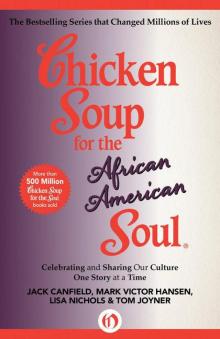 Chicken Soup for the African American Soul
Chicken Soup for the African American Soul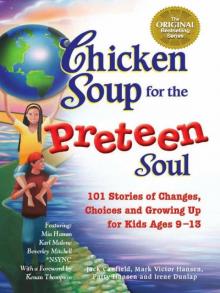 101 Stories of Changes, Choices and Growing Up for Kids Ages 9-13
101 Stories of Changes, Choices and Growing Up for Kids Ages 9-13 Christmas Magic
Christmas Magic Chicken Soup for the Soul: Children with Special Needs
Chicken Soup for the Soul: Children with Special Needs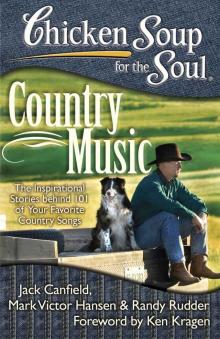 Chicken Soup for the Soul: Country Music: The Inspirational Stories behind 101 of Your Favorite Country Songs
Chicken Soup for the Soul: Country Music: The Inspirational Stories behind 101 of Your Favorite Country Songs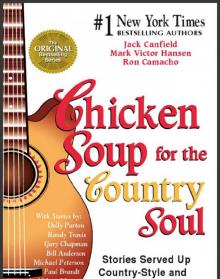 Chicken Soup for the Country Soul
Chicken Soup for the Country Soul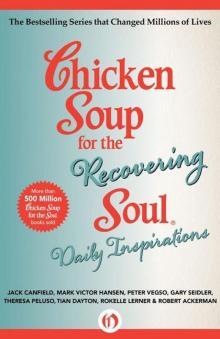 Chicken Soup for the Recovering Soul Daily Inspirations (Chicken Soup for the Soul)
Chicken Soup for the Recovering Soul Daily Inspirations (Chicken Soup for the Soul)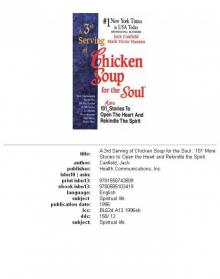 A 3rd Serving of Chicken Soup for the Soul
A 3rd Serving of Chicken Soup for the Soul The Book of Christmas Virtues
The Book of Christmas Virtues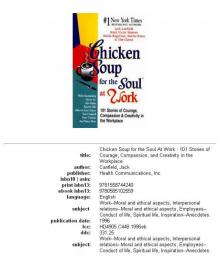 Chicken Soup for the Soul at Work
Chicken Soup for the Soul at Work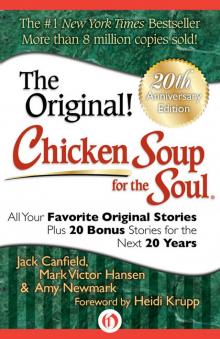 Chicken Soup for the Soul 20th Anniversary Edition
Chicken Soup for the Soul 20th Anniversary Edition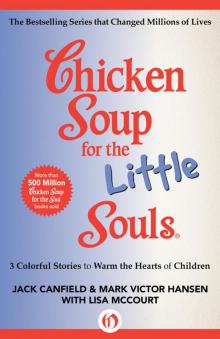 Chicken Soup for the Little Souls
Chicken Soup for the Little Souls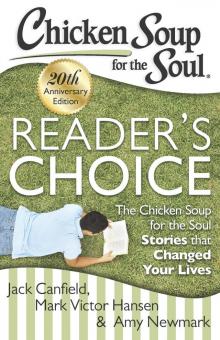 Chicken Soup for the Soul: Reader's Choice 20th Anniversary Edition
Chicken Soup for the Soul: Reader's Choice 20th Anniversary Edition Chicken Soup for the Soul Christmas
Chicken Soup for the Soul Christmas Taste of Chicken Soup for the Teenage Soul III
Taste of Chicken Soup for the Teenage Soul III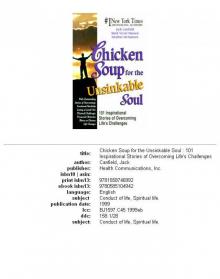 Chicken Soup for the Unsinkable Soul
Chicken Soup for the Unsinkable Soul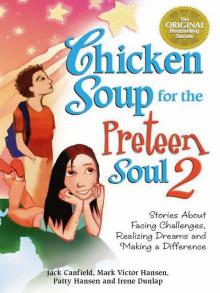 Chicken Soup for the Preteen Soul II
Chicken Soup for the Preteen Soul II